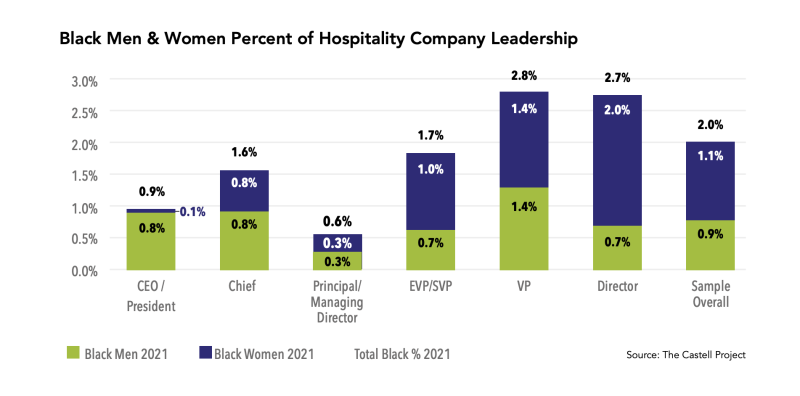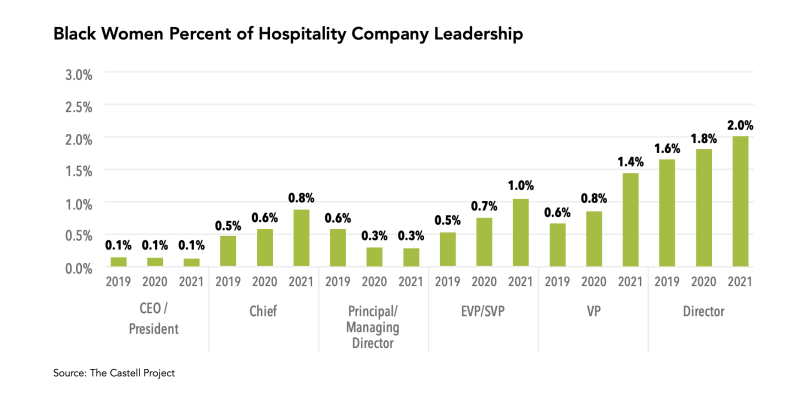The Castell Project, a nonprofit organization focused on promoting women professionals in the hospitality industry, has released its third annual “Black Representation in Hospitality Leadership 2022” report.
“Black representation in leadership for the public face of the hospitality industry is not making the gains necessary to show opportunity to Black employees,” said Peggy Berg, chair of the Castell Project. “In addition, Black employees disproportionately lost hospitality industry jobs during the pandemic. Rebuilding its workforce will require significant change in the opportunities offered to Black hospitality employees if we desire to be viewed as an industry that genuinely promotes diversity, equality and inclusivity.”
Analysts sourced information from the websites of hotel companies listed in the STR Directory of Hotel & Lodging Companies. Most entries were reviewed twice: once on a company’s website and then compared to an employee’s LinkedIn profile. Identification of race and gender was made by visual inspection, so self-identification could vary.
Key Takeaways
The report found that in 2021, only 11 percent of the 671 hotel company websites reviewed for the study showed Black executives (director through CEO) prominently on their websites, a decline from 2019. Those Black executives represented just 2 percent of all hospitality industry executives on company websites reviewed. Representation of Black leaders in the hospitality industry fell from 2.7 percent at the director level to 1.6 percent at the chief (C-suite) level. (These statistics refer to mid-management directors working in corporate offices and shown on websites, not members of the board of directors and not property-level personnel.)

Black employees in the hospitality industry were impacted disproportionately during the pandemic. In 2019, Black employees made up 18.8 percent of the hospitality industry workforce (travel accommodations). In 2021, their share dropped to 13.6 percent. In contrast, across all industries, employment declined only 3.2 percent, and Black workers overall retained their share of jobs.
Black women have stronger representation than Black men at the director level but are less likely to advance than Black men. Black women lost share from 2 percent of directors to 0.8 percent of chiefs while Black men gained from 0.7 percent of directors to 0.8 percent of chiefs. Black women in particular lost ground both as a share of all vice presidents and relative to Black men. This intersectionality, the combined impact of race and gender, is more pronounced for Black women at each higher level.

Black representation in leadership is heavily weighted toward human resources. HR employs 28 percent of Black employees at the director to CEO levels. Black employees are significantly less likely to find opportunity in food and beverage, construction/design or investment/development.
Solutions
“One way to address issues with Black talent in hospitality is to accelerate diversity and inclusion on the investment side of the business by increasing the number of Blacks owning and developing hotels,” Tracy Prigmore, managing partner at TLTSolutions and board director at the Castell Project, said in the report. “Due to systemic racism in this country, Blacks historically have not had the opportunity to attain the wealth required to become owners. Without the financial profile of other races who have passed on wealth for generations, it will take several decades for Blacks to build the balance sheets needed to equitably attract capital and deal flow.”
“We recognize the remarkable support of the many men and women working to advance Black representation in hospitality industry leadership,” Berg added. “However, as Executive Director of Tourism Diversity Matters Greg DeShields says, ‘We need to rethink working in the hospitality industry and rebuild trust. This requires hiring diverse talent into higher levels of management, acting upon the importance of having leaders who reflect the demographics of our customers and creating an inclusive workplace.’”
